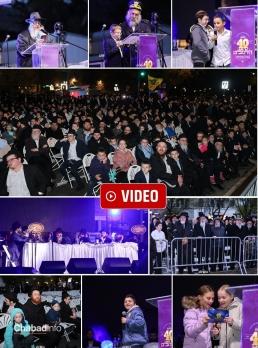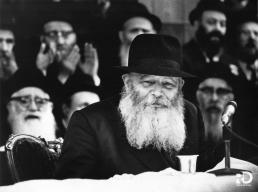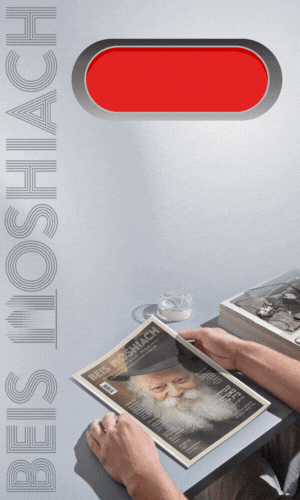Don’t Remember Hakhel
Why did Chazal not establish a “zecher” for the mitzva of Hakhel after the Churban like they did with many other Beis HaMikdash observances? • By Beis Moshiach Magazine • Full Article
By Beis Moshiach Magazine
After the devastating destruction of the second Beis HaMikdash a full line of various Jewish observances which were only applicable in the Beis HaMikdash, were in danger of becoming forgotten and lost.
To save these practices from extinction, the sages of the time, led by Rabi Yochanan ben Zakai instituted a series of edicts under the umbrella of “Zecher l’Mikdash” – “in remembrance of the temple.”
Just one famous example amongst many more:
Mi’d’oraysa, — biblically — we are required to shake the Lulav and Esrog exclusively on the first day of Sukkos. Only in the temple would this practice continue throughout the seven days of the holiday. Upon the destruction of the Beis HaMikdash, lest this temple-custom be forgotten, Jews the world over adopted the practice of shaking the Lulav every day of Sukkos, like in the Beis Hamikdash..
Most temple practices have a remembrance, that is, with one very puzzling exception: Hakhel.
A ceremony like none other, the closest resemblance being the giving of the Torah at Sinai, the Hakhel event was a once-in-seven-years spectacle to which the entire Jewish nation, men, women and even young babies were expected to attend. Several million people miraculously gathered in the courtyard of the holy temple and attentively listened to selected portions of the Torah being read to them by the most august of men of the nation, the Jewish monarch himself.
It was an awe-inspiring event leaving a tremendous impact on its participants. This was exactly its endeavor – “so they shall fear the L-rd, their G-d” and assured an unbreakable commitment to a heartfelt diligent observance of the commandments of the Torah.
Most practices of the Beis HaMikdash were affixed a tribute; just Hakhel, perhaps the most central of them all, was left out!
For generations the idea of establishing a tribute for Hakhel was barely raised and even when it was brought up in the past century, it was an idea that never gained momentum and approval of the majority of contemporary rabbis and sages. Why is it so?
One of the 19th century rabbis who revived the discussion on this matter, Rabbi Eliyahu Dovid Rabinowitz-Teomim, commonly known as the Aderet, offered an interesting answer to our question:
Paying tribute to Hakhel posed a danger to Jews who rarely enjoyed freedom since the destruction of the Beis HaMikdash. Would many thousands of Jews have gathered and appointed one of their leaders to take the place of the king and read the Hakhel portions aloud, it could have easily been translated by the evil governors and rulers as an outright rebellion and attempted coup d’état of the government, something which could have had severe repercussions.
Quite a sensible answer it is, but throughout Jewish history there have been opportunities where a tribute for Hakhel may have been an option due to an improved measure of freedom enjoyed by the Jews, such as during the reign of R’ Yehuda HaNasi who enjoyed exceptional ties with the roman emperor of his time or the extended time-period when the Reish Galusa held office in Babylonia. Yet we don’t find that these opportunities were ever utilized to remember such an awesome event as Hakhel.
The Purpose and the Practice
When analyzing mitzvos, we must differentiate between the purpose of the mitzva – its motive and goal and its specific details – how the Torah expects us to reach that goal.
Tefillin, for instance, are meant to bring us to an awareness of G-d which in turn will lead us to harnessing our thoughts and emotions to serve him. The mitzva’s details however, are many and complex, – which portions should be written; in what and in which order they should be placed; where and when they should be worn; etc.
Hakhel too, has a motive and has defining details: the motive is clearly stated in the portion of the Torah introducing it: “assemble the nation … in order that they shall listen and learn and fear the L-rd their G-d; they shall keep and observe all the words of this Torah.” (Devarim 31:12)
The practical details in a nutshell are the following: it should be read by the king; in the Beis HaMikdash; on Sukkos; in the post-Shemitta year; with men, women and children in attendance.
Ever since the destruction of the Beis HaMikdash we lack many of the conditions that allow for the mitzva of Hakhel to be performed properly thus rendering it halachically inapplicable in our times. (Sefer Hachinuch – mitzva nu. 612)
None of these absences, however, have any effect whatsoever on the relevance of the mitzva’s essence and goal, namely to “encourage them to scrupulously observe the mitzvos and tighten their hold on to the religion of truth.” (Rambam, Mishneh Torah, laws of Chagiga 3:1)
A tribute is to be paid to something of the past. The essence of Hakhel is ever so existent even while we still linger in galus (exile) without the Beis HaMikdash standing and without our own king. Hakhel is about strengthening our commitment to Torah, a theme relevant whether or not we have a king, whether or not we have a Beis HaMikdash, and whether or not we can observe Shemitta.
A tribute therefore, is not paid to Hakhel since it’s not a message of the past to remember, it’s a timeless message to have in mind constantly!
Why, if so, was any form of a grand, central Hakhel discontinued?
It seems the sages refrained from establishing a grand Hakhel gathering, since a watered down version of the event, even if not classified as a zecher, would inevitably diminish the strong impact that a proper Hakhel led by the king in the Beis HaMikdash would have had. The precise details of the gathering were so awe inspiring that a remembrance would be nothing more than an incomparable imitation. Turns out that we must protect the impact of Hakhel by not observing it!
Hakhel Today?
But what about the essence of the mitzva? Aren’t we always supposed to strengthen our commitment to the Torah?
Of course we are! The concern of diminishing the impact of a proper Hakhel would only be in a central event intended to resemble the original Hakhel. Any other sort of Jewish get-together to strengthen commitment to Judaism is greatly encouraged and even crucial to the continuity of Judaism!
Experience has proven time and again that Jews are always ready to strengthen their commitment to G-d and his Torah. Experience has shown that one of the greatest tools to reach this end is public gatherings in which Jews gather for this very purpose and hear heartfelt words of inspiration that have a great, Hakhel-like, impact on practical observance of Torah and fulfillment of mitzvos.
In the final moments of galus, while we still await the real complete Hakhel led by Melech HaMoshiach in the third Beis HaMikdash, we could make it happen sooner by putting together small Hakhel gatherings:
We have no king yet, but each of us is a leader (rabbis, lay-leaders, teachers, parents, older siblings, employers, managers, etc.),
We have no Beis HaMikdash yet, but almost any place can be made holy (a shul, community center, classroom, office, dinner table, etc.)
We don’t have the entire nation at our disposal, but do we have some of its members (students, children, relatives, employees, co-workers, etc.)
We cannot teach the entire book of Devarim without losing the crowd, but we have many opportunities to assume leadership positions in whatever circle we may be in and share a short Dvar Torah, an inspirational story or anecdote, or even a song which will bring those listening to us a step closer to Judaism. We can spend a short minute to pray together for the welfare and security of our brethren in Israel and anywhere they may be and we can all unite by dropping a coin into a pushka and beginning a ripple effect of limitless goodness and kindness!
You’re a king! Gather your nation and bring them closer to G-d
Freely adapted primarily from addresses of the Lubavitcher Rebbe of the 13th of Tishrei, Parshiyos Bereishis and Noach 5748-1987 and several other opportunities.
*
The magazine can be obtained in stores around Crown Heights. To purchase a subscription, please go to: bmoshiach.org
59
Join ChabadInfo's News Roundup and alerts for the HOTTEST Chabad news and updates!











































